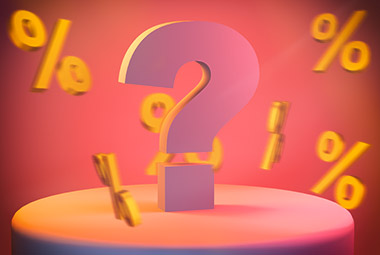On this page
There are some questions that casinos seem eager to answer.
“What game should I play next?”
“What exclusive bonuses are available this week?”
“What’s new and interesting this month?”
These questions, and others like them that encourage players to wager again and again, will always be answered promptly and (generally) with a lot of transparency.
But there are other questions many provers are less keen to answer. One that, on its surface, seems relatively straightforward might be: “what are online casino payout percentages in the USA?"
For a variety of reasons, the answer to this question isn’t as simple as you’d expect.
There are several reasons for this. First and foremost, though, there seems to be a misunderstanding of what payout percentages are.
What are Payout Percentages?
 There’s a big difference between asking ‘which casinos give players the best chances of coming out ahead’ and ‘which casinos have the highest payout percentage…'
There’s a big difference between asking ‘which casinos give players the best chances of coming out ahead’ and ‘which casinos have the highest payout percentage…'
… and that difference basically consists of supply and demand.
Any given game – a specific blackjack table or slot title – will come with its own return-to-player percentage (also known as RTP). For example, a slot with an RTP of 96.5% will pay, $96.50 for every $100 wagered on average, over time. The lower the RTP, the worse things look for the player’s bottom line. Think of this as the demand side of the equation, or the player’s-eye view.
From the casino’s perspective, though, the RTP values of all the different games in the their lobby will likely be unique for each particular offering. They are less interested in what odds each player at each game gets, and more concerned with the total amount of money changing hands across the gaming floor. That’s where the supply side, or casino’s-eye view, comes into play.
Simply put, casino payout percentages are calculated by taking the total amount of money won by players over a given period of time (say, a month), and dividing that by the total amount of money wagered by players during that same period. For example, a casino with a payout percentage of 96.5% will pay out $95.50 in winnings to its players for every $100 wagered by its guests over a given time period.
The Devil’s in the Details
As such, one could see the two numbers (RTP and payout percentage) as two sides of the same token.
But there are some big differences to consider, too. First of all, average payouts are all well and good, but most gamblers want to end up in the black! And that means outperforming the average (which will always favor the house).
Just how to accomplish this is the great interest of just about every gambler the world has ever known. It’s the realm of gaming strategy (such as advantage blackjack), betting strategy, attention to bonuses and special promotions plays a huge role. Also crucial: bankroll management and knowing when to quit (ie: when ahead).
One other very important difference: RTP exists within the confines of a given game itself. Any transaction or withdrawal fees will not be factored in, and neither will casino bonuses, promotions, or other financial factors that aren’t directly part of the gaming experience.
On the other hand, payout percentage looks only at the total amount of money coming in and going out. And it’s not at all concerned with the cash any given player wins or loses during her gaming session!
Finally, if RTP is an average taken across gaming sessions of the same title (which may vary greatly), payout percentage is an average taken across all gaming sessions of all titles!
This means that, depending on the details, it may be even easier to outperform at a casino with a relatively low payout percentage – for example, a casino with a lot of roulette traffic that offers a lot of 000 and 00 wheels will have a lower payout percentage overall than one that offers European wheels… but that means nothing about their slot or roulette offerings.
Back to Reality
 So with all of that in mind, what US casinos offer the best payout percentage?
So with all of that in mind, what US casinos offer the best payout percentage?
The truth is, there’s no definitive answer. Payouts percentages change from week to week, and from month to month.
What’s more, payout percentages are only one small part of what makes a casino worthy of your business! Of course, there are game selection and bonuses to keep in mind, but factors like customer service, trusted reviews and a good reputation are also very important.
And then there’s the true wild card for US-based players and casinos: regulation.
United We Stand, Divided We Wager
Most of the discussion around gambling legalization in the US has to do with which restrictions.
Which States have fully legalized gambling (Nevada and New Jersey, for example), which have decriminalized it (Delaware and Pennsylvania), and which still forbid gambling activities completely. Less often in the public eye, but equally worthy of consideration, is the flip side of legalized gaming – a regulated industry!
States where gambling has long been legal, especially Nevada, offer robust protections for players and casinos alike. Gaming law exists so that players can relax and enjoy their recreation, without worrying about whom to turn to in the event of a misunderstanding with the gaming provider, or a bad actor for that matter.
But gambling in States without strong regulations leaves players unprotected should anything go wrong. Gamblers in Pennsylvania, for example, must be extra attentive when deciding where to play – as their State is relatively new to legal casino status, regulatory bodies haven’t had time to get on firm footing yet.

Share on
Twitter
Facebook
Delicious
Reddit